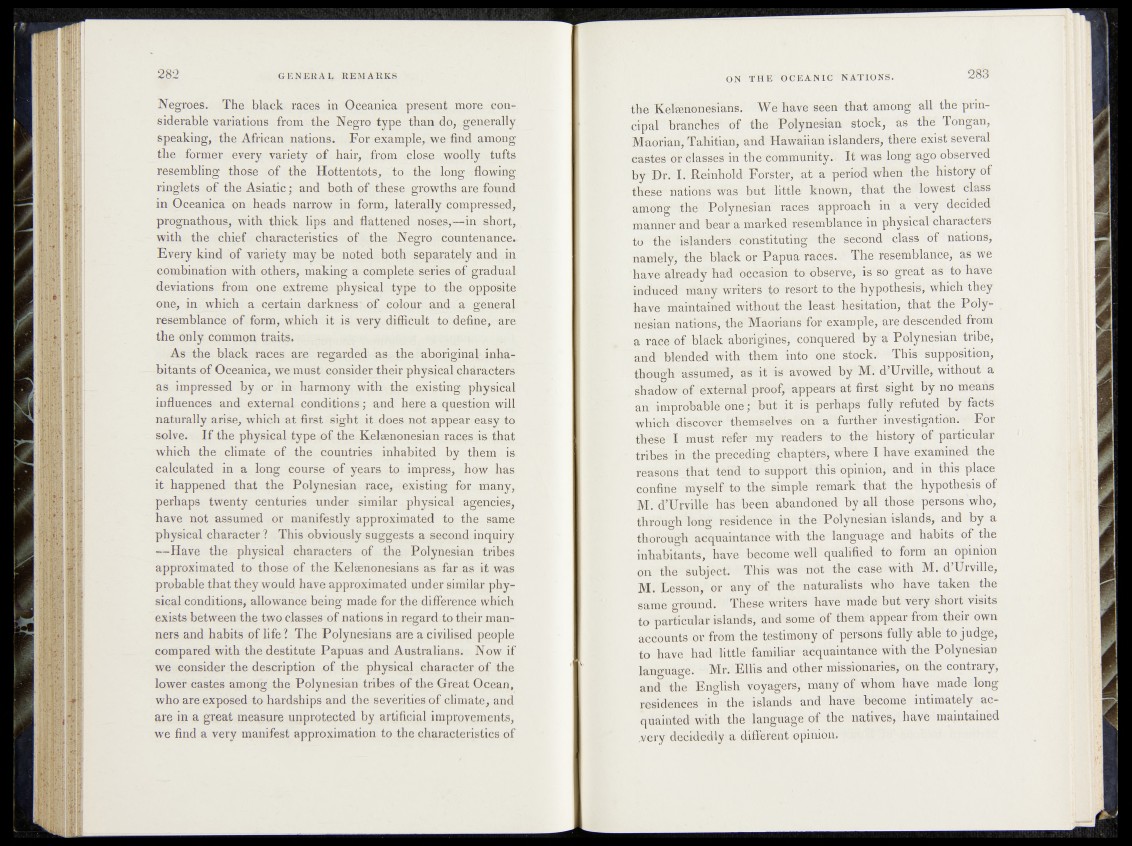
Negroes. The black races in Oceanica present more con*
siderable variations from the Negro type than do, generally
speaking, the African nations. For example, .we find among
the former every variety of hair, from close woolly tufts
resembling those of the Hottentots, to the long flowing
ringlets of the Asiatic ; and both of these growths are found
in Oceanica on heads narrow in form, laterally compressed,
prognathous, with thick lips and flattened noses,--»in short,
with the chief characteristics of the Negro countenance*.
Every kind of variety may be noted both separately and in
combination with others, making a complete, series of gradual
deviations from one extreme physical type to the opposite
one, in which a certain darkness* of colour and .'a general
resemblance of form, which it is very difficult to define, are
the only common traits.
As the black races are regarded as. the aboriginal inha-
- -bit-ants of Oceanica, we must consider their physical characters
as impressed by or in harmony with the existing physical
influences and external conditions ; and here aquastion will
naturally arise, which at first sight it does not appear easy to
solve. If the physical type of the Kelænonesian races is that
which the climate of the countries inhabited by them is
calculated in a long course of years to- impress, how has
it happened that the Polynesian racey existing for many,
perhaps twenty centuries under similar physical* agencies,
have not assumed or manifestly approximated to the same
physical character ? This obviously suggests a seeond.inquiiy
~-Have the physical characters of the Polynesian tribes
approximated to those of the Kelaenonesians as far as it was
probable that they would have approximated under similar physical
conditions, allowance being made for the difference which
exists between the two classes of nations in regard to their manners
and habits of life ? The Polynesians are a civilised people
compared with the destitute Papuas and Australians. Now if
we consider the description of the physical character of the
lower castes among the Polynesian tribes of the Great Ocean,
who are exposed to hardships and the severities of climate, and
are in a great measure unprotected by artificial improvements,
we find a very manifest approximation to the characteristics of
the Kelsenonesiahs. We have seen that among all the principal
branches of the Polynesian stock, as the Tongan,
Maorian, Tahitian, and Hawaiian i slanders, them exist several
castes or classes in the community./ It was long ago observed
by Dr. I. Reinhold Forster, at a period when thé history of
these nations was but little known, that the lowest* class
among the Polynesian races approach iil’a very decided
mannier' and bear a marked* resemblance in physical characters
to' the islanders, constituting the second class of nations,
namely, the black or Papua races. The res&inblance, as we
'have already had occasion to ’observe, is so* great as to have
indhhdi many writers to resort to the hypothesis, which they
bawlmaintainedWithout tbë hesitaidnrthat the Poly* ,
nesiatt nations, the Maorians for example, are descended from
a race of black aborigines, conquered by a Polynesian tribe,
and blended with them into one stock.- This supposition,
though "assumed, as it is avowed by M. d’Urville^without a
shadow of external proof, appears at first sight by no means
an improbable one; but it is perhaps fully refuted by facts
which discover themselves on a further investigation. For
these I must refer my readers to the history of particular
tribes in the preceding chapters, where I have examined the
reasons that tehd} tdsupport ‘this opinion, and in this place
confine myself to the simple remark that the hypothesis of
M. d’Urville has been abandoned by all those persons who,
through long residence in the Polynesian islands, and by a
thorough acquaintance with the language and habits of the
_ inhabitants, have become well qualified to form ah opinion
on the subjèetl This was not the case with M; è ’Umllè,
M. Lesson, or any of the naturalists who have taken the
same ground. These writérs have made but very short visits
to particular islands, and some of thetó?appear from their own
accounts or from the testimony of persons fully able to judge,
to have had little familiar acquaintance with the Polynesian
language. ]VXr. Ellis and other missionaries, on the eontrary-,
and the English voyagers, many of whom have made long
residences in the islands and have become intimately acquainted
with the language of the natives, havé maintained
,very decidedly a different opinion; ;